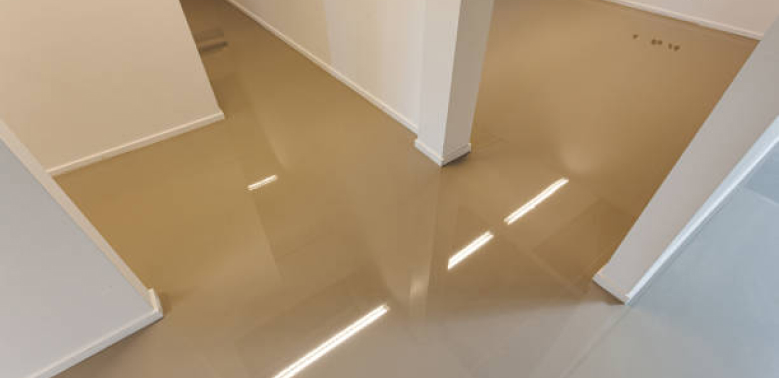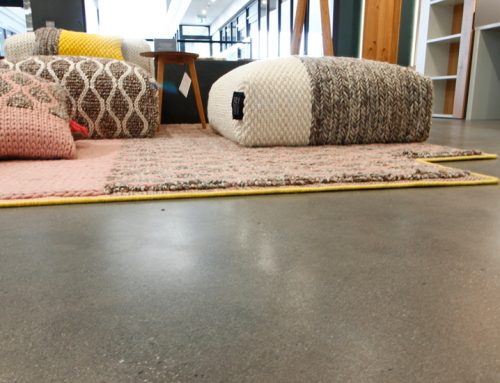If you’re looking for a new or revamped flooring material for your residential or commercial space, you want to find something that will meet your needs, both now and in the long-term.
For many, resin flooring is the perfect option.
But you wouldn’t throw your hard-earned cash at a product you’ve just heard about, so we’ll deep dive into this durable finish and leave you with all the info you need to make an educated choice.
Here’s everything you need to know about resin flooring and whether or not it’s the right investment for you.
What is resin flooring?
Resin flooring is made by pouring a type of resin (like epoxy) onto a concrete surface.
The result is a strong, sleek surface that comes with a long list of advantages in both household and business settings. These include:
- Durability
- Easy to clean
- Relatively inexpensive
- Antimicrobial properties
- Slip resistant properties
- Traffic and weight resistant
What is resin flooring best for?
Resin flooring might not be the best choice across the board, but if you recognise your needs in the following list then resin will likely tick your boxes (and then some).
You’re concerned about… floor durability
Resin flooring is extremely firm and durable once it has completely cured. It is able to withstand pressure, wear and tear, shocks, and impacts from:
- Forklifts
- Vehicles
- Heavy traffic
- Machinery
- Drops and spills
This makes it a great choice for commercial kitchens, car showrooms, garages, and warehouses.
You’re concerned about… price
Resin is a relatively inexpensive flooring option, especially when compared to a brand-new floor or new concrete. This is because it is derived from plastic, and it is manufactured very easily. What’s more, resin flooring can be applied directly on top of existing concrete, even if it is chipped or cracked. This can lead to major short-term and long-term cost savings.
You’re concerned about… short-term damage
Resin flooring can last for 30 years or more when properly maintained, even under harsh conditions. This makes it a popular choice for those looking for a durable, long-lasting flooring option.
You’re concerned about… aesthetics
Along with being extremely durable, resin flooring can be remarkably beautiful and aesthetically pleasing. This is because there are a slew of additives that can add to the flooring to make it uniquely gorgeous, including quartz flakes and metallic additives. Resin floors can also be designed to mimic other flooring solutions, including stone, marble, and tile (without any of the damage concerns that come with these materials).
Are there any situations where resin flooring is NOT the best choice?
Yes! There are a few potential drawbacks to resin flooring that make it unsuitable for certain situations. Specifically, resin flooring might not be your best choice if any of the following features will cause trouble on your residential or commercial floors.
Slippery When Wet
Though you can make resin flooring anti-slip, plain resin flooring is slippery when wet. This can cause a hazard in certain work environments, and it can increase the risk of accidents or regulation violations in certain scenarios. If you know that the floor will be consistently wet – or you’re concerned about traction issues – then resin flooring isn’t the best option for you. ‘
Sun Sensitive
Resin flooring also reacts to ultraviolet light from the sun, which can fade the flooring and affect its look and feel. If you are applying resin flooring to an outdoor space, or a space with many windows, it may not be the most appropriate option.
Are resin floors harmful?
No. Quite the contrary!
Though the fumes that come from resin when it’s being installed can be toxic, the final product can actually reduce your chances of harm thanks it its:
- Water resistance
- Heat resistance
- Scratch resistance
- Oil and liquid resistance
This makes it an ideal option even for residential properties with children and pets.
What are the most common types of resin?
There are many resin flooring options and types. Here’s a deep dive into the most popular types available.
Epoxy Resin
Epoxy flooring is created by mixing epoxy resin with a hardener, creating a hard, smooth surface. This is also a very versatile resin option thanks to the wide variety of options you have.
You can have:
- Metallic epoxy flooring
- Flake epoxy
- Anti-static epoxy
- Quartz-filled epoxy
- Self-leveling epoxy
The result is a stain-resistant, low-maintenance, aesthetically pleasing resin option. That said, the installation process for epoxy flooring can be a little longer than other options. This is because many coats are often used, and the installer must wait 24-48 hours in between coats. This may not be a problem for many, but it’s important to consider if you’re squeezed for time.
Polyaspartic Resin
Polyaspartic resin is a hybrid polyurethane flooring variation that’s known to be:
- Strong
- Scratch resistant
- Glossy and shiny
- Flexible
- Highly adhesive to concrete floor
We recommend polyaspartic as a top coat, a cost-saving resin option, or as a fast-cure flake floor option.
Polyurea Resin
Polyurea resin is a UV-stable, versatile, and durable resin flooring option. It’s known to:
- Provide a seamless finish
- Be fast-curing (which is great if you know what you’re doing, but a problem if you might make a mistake)
- Be chemical resistant
- Be abrasion resistant
- Be more odorless during install than epoxy coating
It’s also available in a variety of styles and finishes.
Methyl Methacrylate (MMA)
If you’re looking for a resin flooring option with nearly instant rapid cure, low VOC, and a variety of decorative finish options, look no further than MMA. It’s important to keep in mind, though, that MMA is much more difficult to install than epoxy resin, so you should definitely consult a professional if you’re interested in this resin.
How is resin installed?
To properly install resin flooring, you must:
- Make sure that the concrete substrate is properly prepared,meaning that it’s textured, even, and free of dust, dirt, and other particles.
- Mix the base material and the hardening agent
- Apply the resin
To ensure a high-quality, crack-free, and even finish, we recommend that you work with an experienced flooring contractor.
Need help with your next resin flooring project?
There is no one-size-fits-all option when it comes to your commercial or residential flooring – even when it comes to resins!
Each resin type has its strengths and weaknesses, and it’s always crucial that you find a professional who can install the floor evenly, safely, and effectively. I
f you would like to learn more about your resin options – or talk to an expert about which option you think is best for your space – you can contact us directly on 0490 777 761 or by filling out the form here.





